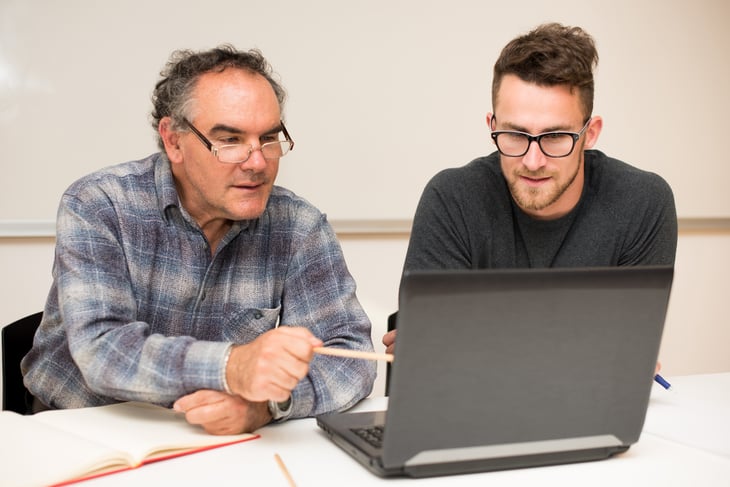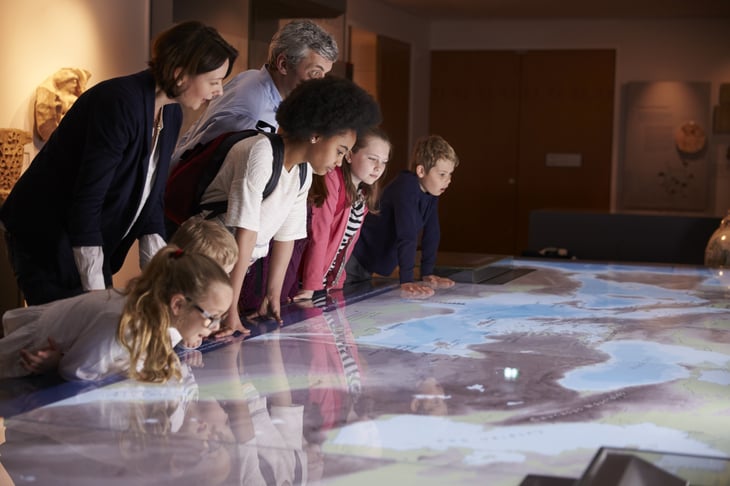

Eventually, most of us arrive at the realization: It’s now or never. The “tick tock” of life’s clock advancing grows louder until you realize that this is the moment to try things you’ve always wanted to do. And the good news about retirement is that you finally have some time to do these things — minus a lot of the self-consciousness that may have held you back when you were younger. We’re not talking about living on a yacht in Monaco here — stuff that is available just to the very wealthy. There are loads of fun, engaging activities and adventures that are affordable for retirees. Here are some to get the juices flowing.
1. Be a campground host

An army of older Americans moves among state, national and private parks and campgrounds, staying for extended visits. In exchange for free camping, they help park managers and campers with chores like leading nature walks, tidying campsites, collecting fees and offering a friendly welcome to other campers. Chores, responsibilities and lengths of stays allowed vary by park. SnowbirdTrails has links to many of these “workamper” (work camper) jobs.
Some campground hosts do it for fun. For many others it is a way of stretching tight retirement incomes. If you’re a “people person,” you may love this gig. If you’re not the social type, keep looking for something else to enjoy. The job requires constant socializing and interaction with others.
2. Help in the classroom

If you’ve always enjoyed the company of children you might really love being a teacher’s aide. Teachers’ aides are paid to help in classrooms in many ways — tutoring, for example, or supervising play or grading papers. Aides take simpler tasks off teachers’ hands so they can focus more on teaching. Ask at your local schools to find out the job requirements and how to apply.
3. Join the Peace Corps

Have you always wanted to join the Peace Corps? You may think you’re too old, but you’d be mistaken. There is no age limit on becoming a Peace Corps volunteer. According to the Peace Corps:
Depending on the volunteer program you choose, your service can last from three months to two years. You can even choose what country you want to serve in, the type of work you do, and when you depart.
4. Become a schoolteacher

You may not need a teaching degree to become certified as a K-12 teacher these days. “Alternative certification” programs help would-be teachers with degrees in other fields get into the classroom. Alternative certification has grown as a means of addressing teacher shortages, especially in certain content areas,” according to National Public Radio.
Requirements vary. And so does quality of certification programs. Contact your state’s department of education to learn how to get started.
5. Join a chorus or choir

You’ve always been a singer. Warbling in the shower is not enough so, now that you have the time, get back to singing. If you are unsure where to start, do some reconnaissance by attending performances of various singing groups in your area. Also, learn what’s available by attending a choir meetup. These will give you an idea of the available groups and their flavor, size, expertise and repertoire before you apply to join. Some choirs are professional quality and deadly serious in their approach. Others are just lighthearted groups of people who meet to express a love of music. Many retirees find a calling in a church choir.
Jump-start your new avocation over the holidays by joining a community singalong of Handel’s “Messiah.”
6. Get into the arts

Making art feeds the spirit. That’s why, soon after retirement, you’ll see many people seek out classes to acquire or relearn skills abandoned years ago. If painting, drawing and crafts are your thing, you might find it useful to sample a variety of classes, materials and approaches before settling on one.
Cities are full of academies and workshops that offer classes to beginners. Community colleges classes and arts and crafts stores have classes, too. These are an inexpensive way to try out a new medium. Or look for a “drink-and-draw” art classes where you and a few friends can spend some lighthearted hours catching up and creating.
7. Set up regular “dates” with your favorite kids

If you are a grandparent whose time with grandkids has been hampered by work, it’s not too late to reconnect. If you are not a grandparent but know children you enjoy, reach out to them. Do not approach a child, though, without talking over your intentions and ideas with their parents and getting permission.
Make dates with each child individually, giving you both a chance to become better acquainted. After talking with their parents, ask the children for their ideas and winnow the list to ones that cost little or nothing. If possible, avoid passive entertainment like movies and video games and go for experiences instead. Examples: Visit the zoo, take walks and explore a different route each time, visit a museum, take a cooking class together, bake cookies and teach each other a skill. Find out if a college near you has a Grandparents University that puts kiddos and elders together in classes to explore hands-on subjects like astronomy or photography.
8. Learn to cook all over again

Unless you’ve been living under a rock you are probably aware that cooking and eating are wildly popular pastimes. But have you considered joining in? Sure, you’ve been cooking all your life, but we’re talking here about forgetting what you know and trying something new — a class in Thai or French cooking, in knife skills or fermented foods or maybe holiday baking. Look for classes at community colleges, at higher-end grocery stores and food cooperatives and at kitchen supply stores like Williams Sonoma, which offers free in-store techniques classes and demos.
9. Sell your crafts on Etsy

After you’ve learned a new craft you may find yourself with more pots, wooden bowls or hammered copper earrings than you know what to do with. That’s a clue it’s time to open a store on Etsy and sell your wares at the huge online arts and crafts marketplace.
10. Build a pocket boat

If you’ve been bitten by the boating bug you may not be able to rest until you’ve built a boat yourself. Have you heard of pocket cruisers? These are lightweight sailboats meant for towing and for small sailing adventures. Make yours in a class or order the plans or a kit and build it independently. If a pocket boat’s too big, build a kayak from one of the many kits available.
11. Drive a school bus

Driving schoolkids is a job that beckons to some retirees. Your school district can tell you its specific requirements. In general, you’ll need to get a commercial driver’s license with endorsements for driving a passenger vehicle and a school bus. You’ll also need to pass a physical examination, police records check, skills and knowledge tests, and other hurdles.
Do school bus drivers really have eyes in the backs of their heads? It could be. Tami Hatke is a bus driver for Tippecanoe School Corporation in Lafayette, Indiana, who shares her experience at School Transportation News. She says that maneuvering a 40-foot vehicle is only the beginning:
You have to love children and understand that children are learning and make mistakes. you have to be very consistent, be a good listener, show compassion, know how to tie shoes, reward good behavior, teach them how to turn their bad behavior into good behavior and be someone that they look up to.
12. Explore your town’s history

One of the many gifts of being older is a sense of connection to the past. You’ve seen enough change in your own life that you are curious about what came before. A great way to explore the past is to start where you live, learning and writing a history of your town or neighborhood. Three tips from an excellent BBC article on writing local history (it applies to American history projects as well as to British): “Don’t guess, don’t invent, don’t try to cut corners.” The article also advises would-be historians:
• Learn as you go along.
• Be methodical in your work and your record keeping.
• Always think of context.
• Don’t assume that only the most glamorous history is worth knowing.
• Work on the basis of themes and subjects, not a chronological progression.
13. Volunteer at your public library

When you give time to an institution like a public library you really are making a gift to your whole community. It’s also a great way to meet people and make new friends.
Financial cutbacks and staff shortages can mean public institutions are stripped to the bone. Volunteers let them enrich their offerings and stretch meager budgets. “The system could not offer the caliber of services currently provided to so many patrons without the hard work and dedication of our volunteers,” says the Volusia County (Florida) Public Library. It’s a refrain that echoes through libraries across the country. Check your library’s website — or ask your local information librarian — to learn about volunteer opportunities.
14. Renew an old friendship

One crucial skill of aging is the ability to make new friends. And yet, a lesson aging makes clear is that the treasure of old friendships and connections cannot be replaced. Get on the internet to find old pals. Some will respond, others will not. No matter. Reach out to them on Facebook. Gather up your courage and attend a high school or college reunion. Or use 411.com to see if you can trace a lost friend.
15. Rediscover spirituality

As the blurry speed of life in your 30s, 40s and 50s gives way to a somewhat slower existence, you may find yourself turning inward and inquiring what’s missing. For some, that’s an intellectual pursuit, done through books and perhaps meditation, personal prayer, service to others or time spent in nature. Others seek answers and connection in community — in a fellowship, synagogue, mosque or church. Whether it is organized religion that speaks to you or a purely spiritual journey, you’re not alone in the quest in older age.
16. Move!

Independence and mobility — things we may take for granted in younger years — are crucial components of a good retirement. Get them from exercise, which is the closest thing to a miracle drug.
Exercise helps manage blood pressure, blood sugar, pain and chronic fatigue — to name a few benefits. Done strategically, it can even help boost memory. Exercise should be fun. If you don’t have a favorite activity, keep looking. Consider tai chi, swimming, yoga, walking, cross-country or downhill skiing, rowing, kayaking, bicycling or tennis. Make sure you get your heart and lungs pumping.
No need to kill yourself. According to The New York Times, only 150 minutes per week of moderate intensity activity is enough:
Walking briskly, at 3 to 4 miles per hour or so, qualifies. So does bicycling slower than 10 miles an hour. Anything that gets your heart rate somewhere between 110 and 140 beats per minute is enough. Even vacuuming, mowing the lawn or walking your dog might qualify.
17. Go on a date

Leaving work behind opens a vacuum for many singles that only human companionship can fill. A surprisingly large proportion of Americans older than 65 are separated, divorced or widowed — 45 percent, according to AARP’s research.
Numerous dating sites focus on bringing 50-something, 60-something, 70-something and 80-somethings and beyond together for romance. SeniorPlanet suggests dating sites for seniors, and U.S. News & World Report tells about the senior dating scene. If online dating turns you off, there are many other ways to meet people. Volunteering, taking classes or joining a house of worship, to name just a few.
18. Adopt a dog …

… or a cat. Or a gerbil. Finding an animal companion is decidedly less complicated than dating humans. A critter who would be thrilled to be your new best friend is as close as the nearest animal shelter. Find animals near you at PetFinder.com, which has photos and profiles of pets from shelters, foster care and other adoption and rescue organizations.
Tending to the needs of another helps push us out of unhelpful internal feedback loops. WebMD writes that having a pet helps with depression. Caring for a pet also enforces a soothing routine, gets you out of the house and walking, offers healing touch, warmth and companionship.
19. Learn something new

Challenge your brain. But don’t expect much from brain training computer games. Instead, get off the computer and learn something that’s seriously hard, something out of your comfort zone. Building new neural pathways keeps a brain agile.
20. Become a hospice volunteer

Helping people who are dying is not for everyone. But those who become hospice volunteers speak of the life-altering experience of helping — or maybe just sitting with — someone who is at the end of life. Hospice Foundation of America explains how to volunteer.
21. Rediscover reading

Were you an avid reader before your life got too busy and complicated to pick up a book? Reading really does transport us to different worlds. It really can make us smarter and more interesting. Now that you are freer, visit the library, book sales and yard sales with your “to-read” list of all the books you can now finally get to. And then give yourself the gift of quiet hours curled up in a comfortable chair, reading.
22. Get a roommate

Crazy, you say? If you are bored or lonely and have space in your home you could share with another, why not earn a little cash and share your home? If you are new to vetting potential roommates, read “How to Live Rent-Free (or Way Cheaper Than You Are Now)” for ideas.
23. Try something you’ve put off

Now’s the moment to tackle things you’ve put off for a lifetime — a new skill, an apology, a round-the-world trip, a brave effort to connect with someone — things you have intended but postponed. No matter how hard or how silly it may seem, giving the tougher stuff a try is what living in our older years is all about.
24. Learn a language

Can you say “neuroplasticity”? It means our brains are changeable — not set in concrete. Some aspects of acquiring a new language are harder for older adults and some are easier, writes The Guardian. And the payoff for the effort is huge because, according to the newspaper, “a number of recent studies suggest that learning a foreign language can slow (an) inevitable age-related cognitive decline or perhaps even delay the onset of dementia.”
25. Usher at a theater or concert

If you love live theater and music but hate the insane ticket prices, you can often find opportunities to get in the door for free by volunteering as an usher. Policies on ushering vary by venue so contact theaters and concert halls near you to ask if they could use your help. Show-Score, a theater blog, tells how to be a volunteer usher and lists some opportunities in New York City. The bonus: You’ll get to meet others who love music and theater as you do. Find usher opportunities here, at VolunteerMatch.org.
26. Become a zoo or museum docent

Another terrific volunteer gig is working as a docent at a museum. Perhaps you think museums are only about the arts and history? Wrong! You’ll find museums of flight, music, railroads, costumes, science and technology. Not to mention museums of anthropology, military history, natural history and stamps — for a few more examples. If you’ve got a passion, or even a vague curiosity, inquire whether a museum, zoo or art gallery that interests you welcomes and trains volunteer docents or guides.
27. Run away from home

Wanderlust strikes. Seize it while you’ve got the energy, the mobility and the means. Sell or rent your home and head out onto the open road in a camper, trailer, RV or, heck, in a tent. Decide on a theme for your life on the road. A few ideas: Visit friends and family; follow Route 66, visit every state in the country.
Mobile retirees are single and they’re couples. Some choose a tiny trailer. Others buy a humongous rig with flat-screen TVs. Regardless, you’ll have adventures. You’ll make new friends, see new parts of the country, meet people you’d never encounter otherwise and get the kind of experience only life can deliver.
28. Go back to school

When we were younger many of us wanted to attend college — or finish a degree — but could not for many reasons, money chief among them. Did you know that if you are age 50 or older many programs allow you to attend college for free? To learn more about schools and programs that help older students attend college or obtain a college degree, see options listed by U.S. News & World Report like scholarships for seniors, living on campus, auditing courses, tuition waivers and online courses. Consumer Reports also lists resources for seniors who want to attend college.
29. Drive a big rig

Some seniors find that driving a truck for an encore career satisfies their wanderlust while giving them a way to earn extra income. Fred Hiebert, who runs United Transportation Driver Training in Manitoba, Canada, tells Forbes.com that retirees are taking his classes for the chance to see the world on their own terms: “The majority of retirees getting truck-driving lessons in Hiebert’s classes are men, but about 40 percent of those men are accompanied on their long-haul trips by their retired wives.” Mature drivers are in demand, Hiebert says.
30. Mentor a small business

SCORE (formerly the Service Corps of Retired Executives), a program staffed by volunteers who are experienced in running a business, offers free mentoring to entrepreneurs. SCORE is in partnership with the federal Small Business Administration. If you have business expertise to share, volunteer here. As the program says, it’s a way to “pass on your knowledge and expertise to the next generation of entrepreneurs in your community.”
How do you envision your retirement? Share some of your own ideas with us in comments below or on our Facebook page.




Add a Comment
Our Policy: We welcome relevant and respectful comments in order to foster healthy and informative discussions. All other comments may be removed. Comments with links are automatically held for moderation.